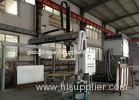

Pneumatic turnover Glass Unloading Machine Automatic Before Glass Cutting Machine
| Place of Origin: | Zhejiang |
|---|
Company Profile
| Location: | Hangzhou, Zhejiang, China (Mainland) |
|---|---|
| Business Type: | Manufacturer |
| Main Products: | Glass Loading Machine, Glass Grinding Machine, Glass Edging Machine |
Product Detail
| Model No.: | YL2518 |
|---|
Product Description
Glass Unloading Machine , Automatic Glass Production Equipment Before Glass Cutting Machine
Specifications:
|
Model |
YL2013 |
YL2518 |
|
Max.Size of Glass |
2000*1300mm |
2500*1800mm |
|
Min.Size of Glass |
350*350mm |
1200*1200mm |
|
Table Height |
900-950mm |
900-950mm |
|
Glass Thickness |
3-6mm |
3-12mm |
|
Speed |
3-10m/min |
3-10m/min |
|
Loader Frequency |
4-5 pcs/min |
4-5 pcs/min |
|
Total Power |
3.75kw |
4.5kw |
|
Floor Space |
3600*2700*3900mm |
4000*3200*4500mm |
|
Weight |
2500kg |
3500kg |
Note: We can produce customize machine according to your requirements.
Applications:
The Glass Unloading Machine , Automatic Glass Production Equipment Before Glass Cutting Machine is
very suitable for unloading various kinds of flat glass, such as solar glass, which has the high automatism
and steady performance in the glass deep processing. It is mainly used in loading the glass from another
device automatical, such as glass straight-line double edger, glass washing machine. Put the glass in the
specified location, after turning on the machine, the sucking begin to work. After it sucks the glass
already, put it on the roller table, transfer the glass to the frontend device automatically. Whe it is need to
adjust both the speed of transmission and the loading glass quantity, the operators modify the
corresponding parameters on the touch screen by both PLC automatic control and manual control in the
whole process, but manually control is primarily used in adjustment and maintenance, each action can be
done separately.
Description:
1. Horizontal motion mechanism, lifting mechanism, roll-over stand on the left side of the beam,on the right
top of the conveyor table.
2. After signal is given, sucking frame transverse moves to the glass stacking frame,and stop at specific
location, the stroke and speed can be controlled by PLC.
3. Arrived at the specified location, the movement of sucking frame becomes from horizontal to vertical
quickly,and be controlled by PLC.
4. After arrived at the specified location, the movement of sucking frame becomes from vertical to
horizontal slowly,and then moves on the surface of the glass,with PLC control.
5. When the detection switch,which is near the suction cups, in contact with the glass, the traverse motor
will stop working, meanwhile the vacuum system begins to work,and the suction cups begins to absorb the
glass.
6. When the vacuum pressure reaches the pressure setting pressure,the vacuum pump stop working, and
the lifting mechanism of the suction cups will rise up 20-30mm, in this location, it’ll stop about few seconds
for ensuring the single piece glass was well sucked up, finally the lifting mechanism vertical up quickly,
and then stop at the specified location.
7. When it arrived at the specified location, the sucking frame back to the origin horizontally and
overturn quickly,keep balance with the transfer table.
8. After arrived at the specified location, the movement of sucking frame becomes from horizontal to
vertical quickly, with PLC control.
9. About 20 mm from the glass surface,the suction cups release the glass by blowing the compressed
air. After the location by the transfer table, the glass quick transferred to the front-end equipment.
10. When the suction cups are blowing the compressed air, the lifting mechanism move up and back to
the origin,roll-over stand overturn and back to the origin too.Meanwhile the glass released from the signal,
and continue to work automatically.
Competitive Advantage:
1. It makes glass move easily and solves the difficulties of glass loading and unloading.
2. To improve the whole line automation, efficiently reduce the labor cost and the risk of industrial
injury by manual work.
&

